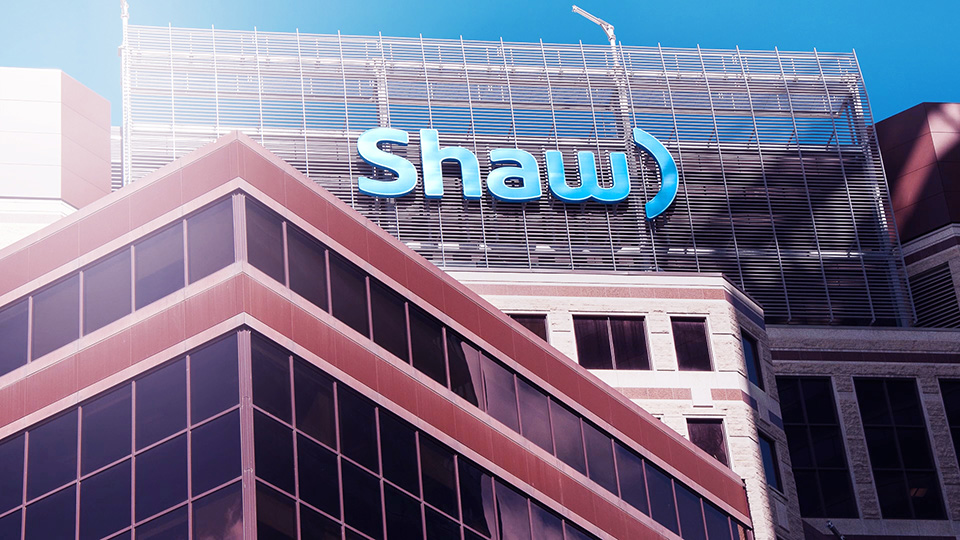Shaw Stock Slide Hints at Regulatory Uncertainty for Rogers Deal
Stock falls 2% Thursday as reports point to possible competitive issues

The smarter way to stay on top of the multichannel video marketplace. Sign up below.
You are now subscribed
Your newsletter sign-up was successful
Shaw Communications stock began to slip March 18, down nearly 2% in midday trading, as reports began to mount that the Canadian telecom company’s planned $20 billion merger with Rogers Communications could get some regulatory pushback.
Rogers said March 15 that it had agreed to purchase Shaw in a cash and assumed debt deal worth about $20 billion. The transaction, which valued Shaw shares at C$40.50 ($32.55), was approved by both companies’ boards of directors and was expected to be completed in the first half of 2022.
Shaw’s stock immediately rose after news broke -- it went as high as $28.05 on March 15, a 46.5% increase from its March 12 close -- but the stock was still far off from Rogers’ offering price. That the stock peaked at $28.17 per share on March 16 (13% below the offering price), and that gap continues to widen -- Shaw stock traded as low as $27.54 per share on March 18 before closing at $27.55, down 1.7% -- has caused some analysts to wonder whether the deal will face some harsh scrutiny.
Also Read: Altice USA to Buy Morris Broadband for $310 Million
The deal will be reviewed by three Canadian regulatory agencies -- the independent Competition Bureau of Canada, the Canadian Radio-television and Telecommunications Commission, and the Department of Innovation, Science and Economic Development. According to reports throughout the Canadian press, the main issue appears to be the removal of a fourth wireless carrier -- a sticking point with Canadian regulators -- and even Rogers’ promises to keep prices level for Shaw’s Freedom Mobile plan for three years and boost deployment of 5G may not be enough.
Rogers has pledged to invest C$2.5 billion ($2 billion) in 5G networks across Western Canada, creating up to 3,000 new jobs. In addition, Rogers promised to create a C$1 billion ($800 million) fund dedicated to connecting rural, remote and Indigenous communities to high-speed internet across the four Western provinces and spend another C$3 billion ($2.4 billion) to support additional network, services and technology investments
While the regulatory agencies have pledged to scrutinize the deal, some Canadian politicians have expressed doubt about the benefits of the merger.
The smarter way to stay on top of the multichannel video marketplace. Sign up below.
“Big telecom companies are gouging Canadians and continuing to make massive profits in a time where most families are struggling to get by. A merger between two of Canada’s biggest providers will just make it worse,” New Democratic Party leader Jagmeet Singh said in a statement after the deal was announced.
On the conservative side, MP Pierre Poilievre, the Conservative Shadow Minister for Jobs and Industry, called for hearings into the proposed deal.
“Some argue the Rogers-Shaw deal means more investment, others that it means less competition,” Poilievre said in a statement. “The only way to know for sure [is] through careful and intense debate. Conservatives want the Industry Committee to hear from customers, workers, business leaders, engineers, economists and other experts to get a complete understanding of the proposed deal.”
Poilievre added that the deal, which would create a C$50 billion telecom powerhouse with C$20 billion in annual revenue, 33,000 employees and about 13 million wireless customers, would be important in any era, but is especially critical during the COVID-19 pandemic, which has forced many Canadians to work from home.
“If some communities cannot get fast, affordable connections, their people will be left behind.” he continued. “Conversely, fast, affordable wireless combined with remote work could revive struggling rural, remote and indigenous economies like we have not seen since the urbanization phenomenon began. For it to happen, we can no longer accept poor internet at high prices.”
Canadians pay some of the highest cell phone bills in the world. According to a report by Finnish telecom research company Rewheel, the Big Three Canadian wireless service providers -- Bell, Telus and Rogers -- had the least competitive rates globally. Other reports have compared Canadian wireless rates between 15% and 40% higher than in the U.S.
It has become such an issue that reducing Canadian wireless bills was a key part of Prime Minister Justin Trudeau's 2019 reelection platform. In March, Trudeau made good on that promise, requiring telecom operators in the country to reduce their charges by 25% over the next two years.
Conservatives to force hearings on Rogers-Shaw. pic.twitter.com/MtJ8qPM173March 17, 2021
Mike Farrell is senior content producer, finance for Multichannel News/B+C, covering finance, operations and M&A at cable operators and networks across the industry. He joined Multichannel News in September 1998 and has written about major deals and top players in the business ever since. He also writes the On The Money blog, offering deeper dives into a wide variety of topics including, retransmission consent, regional sports networks,and streaming video. In 2015 he won the Jesse H. Neal Award for Best Profile, an in-depth look at the Syfy Network’s Sharknado franchise and its impact on the industry.

